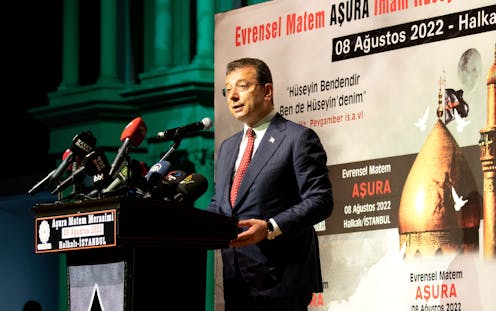Date:
Author: Deniz Torcu, Adjunct Professor of Globalization, Business and Media, IE University
Original article: https://theconversation.com/turkey-democracy-crisis-where-religion-power-and-repression-intersect-253458

The arrest of Istanbul’s mayor, Ekrem İmamoğlu, on 19 March has put a spotlight on the state of democracy in Turkey. It marks a possible turning point in the gradual dismantling of the country’s secular and democratic pillars.
At its founding in 1923, the Republic of Turkey was established as a secular state under the leadership of Mustafa Kemal Atatürk. Secularism was seen as essential to modern development, as it decoupled state power structures from religious authorities.
However, recent studies demonstrate that this separation has become weaker since the Justice and Development Party (AKP) came to power in 2002.
Turkish politics researcher Jenny White notes that, under the AKP, Islam has moved from occupying a private space to becoming a tool of political legitimacy under the AKP. In her 2014 book Muslim Nationalism and the New Turks, she explores how the AKP has promoted a national-religious identity as an alternative to traditional republican secularism.
This transformation of secularism in Turkey has also been accompanied by an overhaul of national identity. According to a study by the Brookings Institution, Erdoğan’s government has promoted a religious and conservative vision of what it means to be Turkish. This has weakened the republican pillars on which the country was founded over a century ago.
Rather than occupying a private or spiritual space, Islam has been increasingly integrated into the official state narrative as a tool of political cohesion and moral legitimacy. This redefinition has had clear consequences: reduced scope for dissent, curtailed individual freedoms, and the spread of a cultural, religious identity that excludes significant parts of society.
Competitive authoritarianism
Authors llike Steven Levitsky and Lucan Way developed the term “competitive authoritarianism” to describe a regime in which democratic institutions formally exist, but are hollowed out by hegemonic government control.
In Turkey’s case, various practices that contribute to unfair electoral competition have been documented. These include co-opting the judiciary, controlling the media and disqualifying opposition candidates.
İmamoğlu’s arrest on charges of corruption and alleged links to terrorism fits this pattern. He had emerged as a viable challenger to AKP hegemony after winning the 2019 and 2024 mayoral elections in Istanbul, a city with high symbolic and political value. International analysts are interpreting his arrest as a move to exclude him from national elections.
Weaponising the justice system
In recent years, Turkey has seen repeated use of judicial proceedings to exclude political opposition. According to Freedom House’s 2024 report, Turkey is classified as “not free”, with declining scores on judicial independence and civil liberties. The detention of more than a thousand people following İmamoğlu’s arrest, including journalists and protesters, has been denounced by organisations such as Human Rights Watch and Reporters Without Borders.
In this context, the application of the law is transformed into a tool of control. Guillermo O’Donnell called this “bureaucratic authoritarianism”: a selective use of legality to maintain institutional forms while eliminating their democratic functions.
The Turkish-born economist and Nobel laureate Daron Acemoglu has argued extensively that democratic decline is directly linked to weak institutions and the lack of checks on executive power. In his 2013 book Why Nations Fail, he argues that inclusive institutions are key to development and stability, while those captured by extractive elites tend to result in authoritarian or inefficient regimes.
The current situation in Turkey – where control over the judiciary, the media and the electoral system has been progressively centralised by the executive – illustrates the consequences of this institutional capture.
International implications
Turkey is a case study for understanding the transformation of 21st century democratic regimes. In their 2019 book How Democracies Die, Steven Levitsky and Daniel Ziblatt warn that contemporary democracies are not usually brought down by coups d’état. Instead, they are unpicked by a progressive erosion of institutional checks and balances from within the system itself.
Events in Turkey show how leaders can weaken secularism, concentrate power and criminalise the opposition within a political model that still retains a democratic façade. This “normalisation” of a shift towards autocracy should be a warning to other vulnerable democracies.
Ekrem İmamoğlu’s arrest is a key episode in a structural process of the Turkish political system’s transformation. Viewed through the theories of competitive authoritarianism, democratic regression and political secularism, it is clear that this is not an isolated episode of repression. It signals a profound ideological drift, one that threatens the essence of the modern Turkish republic founded more than a century ago.
![]()
Deniz Torcu no recibe salario, ni ejerce labores de consultoría, ni posee acciones, ni recibe financiación de ninguna compañía u organización que pueda obtener beneficio de este artículo, y ha declarado carecer de vínculos relevantes más allá del cargo académico citado.
